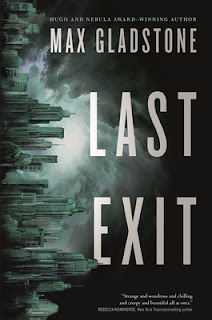Eyes of the Void is the sequel to the excellent Shards of Earth, which we reviewed, well, far too long ago now. I think the sequel must have been held up by the pandemic. But in any case, it's going to be on shelves soon, so it's time to give it a look and see whether it's worth reading. .
Yes.
Just wanted to get that out of the way right off the bat. This is top quality space opera. It has characters you can sympathise with, and empathise with. It has some aliens that feel like people, but also feel different, with perspective soutside our experience. It has some humans that feel like aliens, too. Some because they've modified themselves in personal ways that change the way they present, some because of the way their society shaped them, and some just because their perspective has shifted out past the lens of common experience. This is one of Tchaikovsky's strenghts: giving us a vast array of different possibilities embodied in people. This is a universe steeped in the waters of conflict, one aware of the costs, but it's also a universe teetering on the ege of transhumanism, of defining, redefining and ignoring what different people think it means to be human. The breadth of imagination on display is stunning. From the technologically super-powered clams, whose dialogue is delphic enough it requires interpretation by human acolytes, through the society of tank-grown women, determined to save both the universe and themselves, to the shattered remnants of a grimy human polity, struggling to rebuild itself after an apocalyptic conflict, and beyond that into the truly unknown. Every few pages you're left thinking "Oh, that's pretty cool." In its depth and detail, grandeur and grime, there's a living, breathinng universe resting in the pages in front of you, and it always feels vibrant and real.
The characters...well, in a way there's no surprises. You'll know the central cast of reprobates from the previous book. I still have every sympathy for Idris, a man brought out of time, both metaphorically and physically. A man crushed by the things that were done by and to him during a past war, now desperately trying to rebuild in peace - or at least, prevent atrocities from happenning again. And his crew of smart mouthed, feisty folk are as diverse, exciting and entertaining as ever. Watching a ships lawyer duel with swords as well as words (and sometimes both at once) will never not be fun. As is seeing a giant scorpion battlebot go on a rampage. But I digress. Idris is people. Sad, sometime slonely, feeling a little broken and displaced, but definitely people - and so are all the other folks around him, whether or not they're, well, human. Tchaikovsky shapes his characters with care, giving us people we can feel for, people we can forgive, people we can understand. Whose pain he draws so artfully you can feel it searing your own soul, and whose joy can leave you turning pages on a grey day with a smile.
Basically, to be a little less lyrical for a second, both our protagonists and their foils anre fully realised people in their own right, not ciphers on a page. They live and breathe and feel real, and as a consequence, we, the reader, feel alongside them. I know I've missed these folks, and I bet you have too.
The plot - well, I won't spoil it. If nothing else, this is another brick thick story, so I'd probably struggle to spoil it if I wanted to, because there's just so much going on at any given ti,e. But somehow it all hangs together, the tightly woven strands of interweaving story and character drama coming together to make a narrative tapestry that is a thing of beauty. And also a thing that will leave you turning pages late into the night, wanting to know what's going toi happen next. I will say that there's some amazingly depicted space battles, some wonderfully byzantine politics, and a cavacalade of love and joy and sorrow and wrath and defeats and triumphs enough to go around. You're not going to be bored, that's for sure.
In the end, you're probably here to know if you should reaad this. If you're in the market for a vital, intriguing, fascinating, explosively entertaining space opera, then yes, yes you should.




